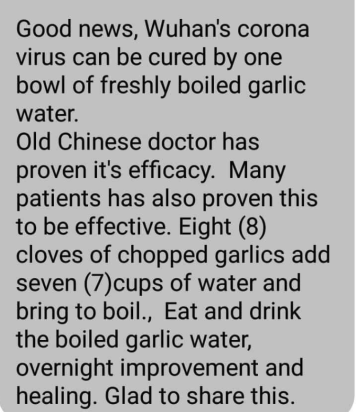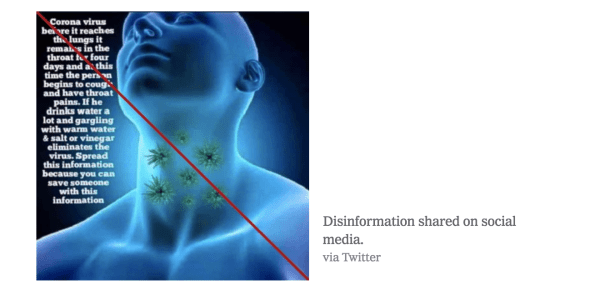Here’s the tl:dr version of my post today:
What are the top 10 cures for for COVID-19?
- there
- aren’t
- any.
- Anyone
- saying
- there
- are
- is
- a
- liar.
Every time illness breaks out, there are lots of enterprising charlatans out there, trying to take advantage of our vulnerability. So it is now with COVID-19. What are some of those unscrupulous blackguards peddling (either in goods or false rumors)?
First, there’s garlic.

Apparently, this rumor got so much traction that the WHO felt the need to add it to their page of debunked myths about the coronavirus:

And also: gargling salty water.

Gargling may make your sore throat feel better, but it’s not going to have any effect on the virus. None at all.
Here’s another: Chlorine dioxide. What is that? Factcheck.org, tells us more here and below:
Chlorine dioxide kits are sold online under various names — Miracle Mineral Solution, Miracle Mineral Supplement, Master Mineral Solution — but they are most often referred to as MMS.
These kits typically include a bottle of sodium chlorite and a bottle of an “activator” such as citric acid. When the two chemicals are mixed together, they make chlorine dioxide, a common industrial bleach used in the production of paper products, according to the federal Agency for Toxic Substances and Disease Registry.
But MMS hucksters sell the chemical solution as a cure-all for cancer, AIDS, autism and, now, the novel coronavirus.
Again, the WHO says no to bleach (either ingesting it or pouring it on one’s body) as a treatment for COVID-19 (or anything, for that matter).
Here’s yet another one: substances with the name chloroquine. This refers to an anti-malarial drug (which HASN’T been shown to be effective against COVID-19), but also to a solvent used to clean fish tanks. An Arizona couple heard a news story about the anti-malarial drug and thought the fish tank cleaner had the same substance; they decided to put some in liquid and drink it. The man died and the woman is in critical condition. You can read more about it here, and below:
“Given the uncertainty around COVID-19, we understand that people are trying to find new ways to prevent or treat this virus, but self-medicating is not the way to do so,” Daniel Brooks, Banner Poison and Drug Information Center medical director, said in the hospital’s statement. “The last thing that we want right now is to inundate our emergency departments with patients who believe they found a vague and risky solution that could potentially jeopardize their health.”
Then we have: the online swindlers who cook up bogus medical treatments and sell them to vulnerable people during times of outbreak and uncertainty. One such miscreant, Keith Lawrence Middlebrook, was arrested on Wednesday:
[Middlebrook] is charged with one count of attempted wire fraud, which carries a punishment of up to 20 years in prison.
In videos he posted this month to his 2.4 million Instagram followers, Middlebrook showed off nondescript white pills and a liquid injection he claimed would offer immunity and a cure, respectively.
“Not only did I make the cure, but this pill right here is the prevention,” he said in one video. “Meaning, if I walk into the Staples Center and everyone’s testing coronavirus positive, I can’t contract it. It’s impossible. … I have what makes you immune to the coronavirus.”
You might be thinking: Srsly? Who would believe that some guy would have found THE medical concoction that does double-duty as both prevention and cure for a brand-new virus? I mean, who could be that gullible?
We can. We can believe anything when we’re scared, when we or our friends/family are sick, and when there aren’t any current treatments out there.
So, what can we do while waiting for medical science to hurry up and help a planet out?
I have three suggestions:



Zoom with friends, family, coworkers, yoga classmates, neighbors, distant relatives, old prom dates, vacuum cleaner salespeople, former pets, future ex-in-laws, fellow ex-patriots, third-grade teachers, part-time hairstylists, amateur boxers, Irish stepdancers, out-of-work tour guides, licensed taxidermists, in-the-know gossip columnists, tree surgeons, romance novelists, new moms, old cowhands, child psychiatrists, or orchid enthusiasts. That’s a start.
Have you, dear readers, heard any rumors about cockamamie cures or treatments or preventatives for COVID-19? Please feel free to share them so we can all revel in their bogusness.
No doubt there are opportunists and swindlers peddling fake cures, as well as gullible and wishful people who are poised to believe in dangerous treatments on the basis of thin anecdotes and testimonials. I’ve done some “reveling in the bogusness” of those who confidently offer curative “energy healing” at a distance, and (even worse) “laying-of-hands” cures. It can feel good to revel in the difference between our knowledge and others’ ignorance. Perhaps too good?
I do worry about setting up a simple line between mainstream medicine and “everything else.” Without thinking it’s a miracule cure — or even a “cure” at all — a person can be reasonable to supplement hygiene with practices like gargling and using a neti pot, for example, or with nutritional supplements that seem to have a particularly positive effect on their own bodies, even if it’s not a reliably blind-study-friendly phenomenon. Neti pots certainly require skill, moderation, and safety precautions (in order to avoid introducing bacteria and new irritants), so I can see why mainstream health advisors are wary of recommending them. Yet their use can function as an extension of hygiene (wash hands, wash face, rinse mucous membranes).
Especially if Friday’s New Yorker article is correct (https://www.newyorker.com/magazine/2020/04/06/how-does-the-coronavirus-behave-inside-a-patient), factors that even slightly reduce the viral “load” during early stages could reduce the severity of the illness. (Not proven, sure. But also not irresponsibly speculative.) A gargler who claims salt water will simply “kill” the virus or “cure” the disease is spouting nonsense, but the practice itself can be humble in its ambitions. Since there are clearly many variables that affect how severely this virus takes hold after exposure, I think we should all be very curious to consider what kinds of variables might tilt the odds.
So, with respect to dietary and hygienic practices that are affordable and not dangerous — and as long as people don’t think of them as an excuse to treat themselves as above safety protocols and other forms of vigilance — I would like to avoid ridiculing people like the humble gargler (who doesn’t endorse the graphic above), and not to lump them with the fraudulent profit-driven opportunists. I worry that an outrage-fest can easily move in such a polarizing direction. Though lots of health-related practices are “old wives tales,” sometimes “old wives” (and “spinsters”) are onto something.
HI E Springer, and thanks for your very thoughtful response. I have a lot to say about this (I do research on the epistemology and ethics of health promotion, health metrics, risk assessment and translation of all of those things into clinically significant recommendations). But I’ll try to be relatively brief here (your response is inspiring me to do another blog post based on your comments here!).
You’re right that we shouldn’t treat gargling with salt water in the same category as drinking fish tank sanitizer. And yes, there are a lot of self-care practices we do that either 1) don’t improve health based on available evidence; or 2) we don’t have evidence to say either way whether they improve health. And further, sometimes details matter, as in neti pot use.
What I worry about as a public health person these days (well, all days) is this: while it’s true that sometimes the humble remedies or health-promoting practices are benign or actually helpful, sometimes/often people stick with those remedies and practices instead of and to avoid shifting to less familiar, more difficult or inconvenience and evidence-based treatments or guidelines.
We (the humans) have a hard time letting go of our beliefs and practices that shore up the idea that we are actually helping ourselves when there’s an emergency. This is a good thing in many ways. But taking up new habits and treatments often means acknowledging that our old ways aren’t cutting it (like gargling with salt water, which we might do as a part of convincing ourselves that we don’t have to do more drastic things to deal with say, being ill with COVID-19).
I’m trying to work this out myself, so thanks a lot for reading and communicating with me about this super-difficult topic.
-catherine
It sounds to me that the gist of your concern goes along the lines of, “if it isn’t hurting them, what is the harm in a little reassurance?” I would argue that there IS harm, if the reassurance comes in the form of falsely believing that one’s less evidence-based treatments are enough, in lieu of the more evidence-based solutions. If, for example, someone is gargling saltwater and that means they are less likely to frequently and sufficiently wash their hands. We can only focus on so many things at once, and I am hopeful that folks are using their energies in the most meaningful and successful ways possible, for all our sakes.
Ugh. Don’t get me started.
What pisses me off the most are the televangelists hawking “holy water,” magic handkerchiefs, and various quack devices and concoctions of their own design to their gullible followers. Some of them even promise that their god will cure people who send large donations. Televangelists are frauds under any circumstances, but they should be criminally charged for endangering public safety as well as ignoring bans on large gatherings.
As for what’s the harm, I refer you to http://whatstheharm.net/ and https://quackwatch.org/ .
If you’ll forgive a shameless plug–it sounds like you’d enjoy my article here on Pseudoscience Trigger Warnings. 🙂 http://fitisafeministissue.com/2019/12/02/trigger-warning-pseudoscience/
Great post and very valuable comments from all!
I’d add this: now is a time that we can all be thankful for the blessings we have, and ONE of those blessings is the amazing medical researchers working their asses off to develop treatments, vaccines, and other testing mechanisms to get us through this.
Scientific research has never been more urgent – a welcome reminder that, despite the nature of public discourse for a while now (basically, “experts BOO HISS”), in fact those with complex knowledge in medical and clinical research are exceedingly valuable humans willing to sacrifice their own safety and comfort for the public good.
Another blessing, of course, is the incredible health care workers on the front line, and those (often underpaid) folks who are keeping basic essential services running. We’re rightly celebrating those people a lot. Let’s also celebrate the scientists quietly beavering in their labs around the world – they have what we need and they are working overtime to get it to us.